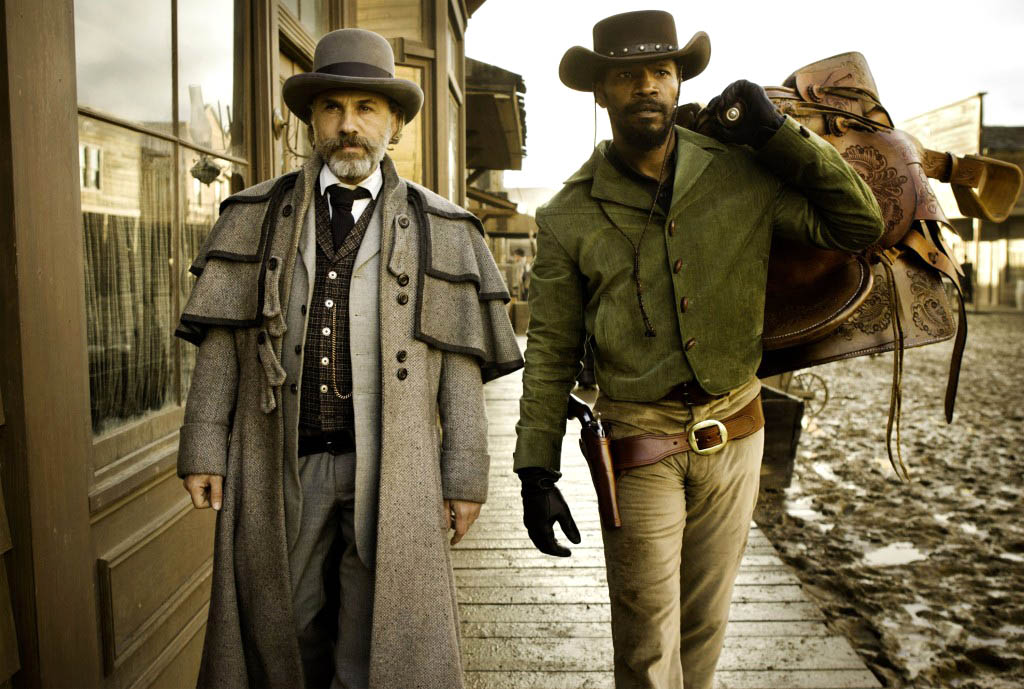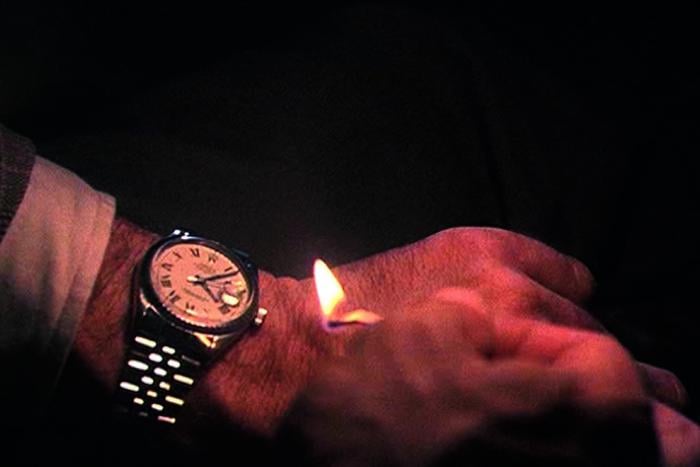Every week or so, Sook-Yin Lee and Adam Litovitz have a movie date. Then they talk about the movie. Discussed this week: Django Unchained, directed by Quentin Tarantino.
ADAM: One of the immediate ethical considerations that the movie brings up is what sort of language we can use in talking about it. The “n” word was used so aggressively and repetitively. Should it become a part of our discussion? Or, should we dance around it? The movie goes out of its way to make us both feel comfortable and uncomfortable laughing about certain things.
SOOK-YIN: Tarantino’s an entertaining provocateur. At the end of the movie I was like, “Wow, how on earth do I even begin to speak about it?” Django Unchained—slave joins forces with a bounty-hunter and treks across the Southern U.S. a few years before the Civil War to kill as many slave masters as possible.
ADAM: In some ways it’s a simplistic genre exercise and revenge story, with showdown after showdown and intrepid heroes.
SOOK-YIN: “Kill white folks and get paid for it, what’s not to like?” It’s a standout phrase that Django [Jamie Foxx] says to his bounty-hunting partner Dr. Schultz [Christoph Waltz] which conveys a great deal of what the movie is about: flesh for cash. There’s Mandingo fighting, with black, buff slave-men wrestling to the death. There are slave women forced into prostitution on wealthy plantations. There are bounty hunters killing for top dollar. And incredible, soaring box office sales for Quentin Tarantino. A huge lineup snaked around the multiplex for his three-hour movie. He gets bums in seats. When we came out another legion of people were lined up.
ADAM: As far as I can tell, it’s not going to teach anybody much about slavery, or corruption, or America. A character puts it blatantly: “it’s a dirty world.” The movie expresses an on-the-nose cynicism that’s well-suited to 1858 America. There’s no doubt that the South was a corrupt place. But I’m not sure the movie is that edifying. It was, in parts, very entertaining—particularly juicy character parts like Samuel Jackson’s. But there were also long stretches of either showdown after showdown or explanatory campfire storytelling scene after explanatory campfire storytelling scene.
SOOK-YIN: Just like The Hobbit—fight scene after fight scene. Tarantino’s hit upon a winning formula. With Inglourious Basterds and Django Unchained he’s realized the power in rooting for the underdog and killing the bad guy. While watching Inglourious Basterds, every time there was a shoot-up of Nazis, there was uproarious cheering, to a point where I found it disturbing. We love to see the body count. It made me question our desire for entertainment. Kill the bad guys, and people really like that: exploding slave masters, stupid and cruel slavers being duped.

SOOK-YIN: He’s like the indomitable Bruce Lee. Tarantino’s got all his influences on his sleeve. He’s a genre guy. He loves cowboy films, martial arts movies. I’m not familiar with the original Django released in 1966. What’s it about?
ADAM: The original Django was a Sergio Corbucci Spaghetti Western about a disturbed Union soldier played by Franco Nero who gets revenge on a former commander. It takes place round about the Civil War, too. Nero made a cameo in Tarantino’s movie.
SOOK-YIN: So, he’s a disenfranchised loner who’s powerful and skilled with guns?
ADAM: Something along those lines. He’s a hero. Django was really popular in Jamaica. In The Harder They Come, there’s a scene with a bunch of Jamaicans cheering wildly during a screening. It’s empowering. Django Unchained had a bit of Blazing Saddles to it. There’s a Klu Klux Klan scene where you get to watch Jonah Hill decide to wear a bag or not.
SOOK-YIN: What’s interesting about Tarantino’s movies isn’t his big ol’ academic brain. He’s an entertainer and a lover of movies who mixes it all up. In three hours, there’s never a dull moment. It’s stylistically gorgeous. He knows how to craft scenes and keep you watching. He knows how to make you root for a hero, and how to twist things in an ironic way. I was marveling at how good a character actor Samuel L. Jackson is.
ADAM: He’s amazing in this, instantly scene-stealing. He brought the movie back to life.
SOOK-YIN: He’s a fantastic presence, playing a racist black butler named Stephen with conviction. I’ve never seen that depiction before. Although simplistic, Tarantino hits a nerve. The average person will get it. With this character, you see that racism can be turned towards one’s own race.
ADAM: Stephen’s also pushed into that position by the way society worked. If he didn’t become that groveling, boss’s pet, he would have been in the field doing hard manual labour.
SOOK-YIN: Yes and no. I felt his character made a personal choice. Not every slave hates his master. He seemed to be very racist against his own kind. Tarantino throws it all together in a strange hodge-podge. Spike Lee’s boycotted the film. He finds it disrespectful to his ancestors, and tweeted that slavery wasn’t a Sergio Leoni Spaghetti Western, but a Holocaust.
ADAM: On one hand, I agree with Spike Lee that, of course, slavery isn’t a cartoonish shoot ‘em up. But, Spike Lee hasn’t seen the movie. It’s not exactly the sunniest depiction of slavery. Even if you’re laughing and having a good time for three hours, you’re still wallowing in a crazy situation. It’s sometimes a too-obvious attack on American corruption, indicting us all. We’re being chided or goaded, but aren’t left knowing what to do about it. The movie’s saying: “Buck up. It’s a hard world, so let’s live in a fantasy version of it.” Django Unchained doesn’t trivialize slavery, but it also doesn’t present it in the most complex way.
SOOK-YIN: As much as I understand Spike Lee’s stance, I don’t advocate boycotting any movie. It’s interesting to throw it out there and see what kinds of conversations are started. I felt discomfited by Inglourious Basterds, seeing people cheering at people being killed. Tarantino turned the experience into part of what the movie was about. Here, I didn’t feel the same game being played on us.
ADAM: It was taking glee in revenge.
SOOK-YIN: But I didn’t sense the same mounting euphoria we had at watching the Nazi body count.
ADAM: It just might not have been as skillful in mounting its body count towards euphoria, but it seemed to be trying to achieve that, with showdown after showdown.
SOOK-YIN: I think he’s going for something different here—the notion of flesh for cash. It’s not just about slavery. The charming Dr. Schultz, who’s like a Cheshire Cat, and is a wonderful mentor to Django, makes a living by delivering the dead bodies of lawbreakers. Flesh for cash equals a booming box office that we’re happy to participate in.
ADAM: Unlike Reservoir Dogs, which also has everyone pointing guns at each other, we know that this hero’s going to make it. He’s able to do impossible things. If anything, Tarantino’s become more steeped in fantasy heroism than ever. Everyone was equally vulnerable in Reservoir Dogs or Pulp Fiction, where John Travolta was suddenly blown away. Tarantino’s on a different trip now.
SOOK-YIN: Reservoir Dogs was a much more complex character study. It took an iconic Hong Kong action movie and inverted it, playing it for character. Here the characters are different. We know certain people are invincible. There’s a certain safety and relief in knowing they won’t be undone. There’s something in a more simplistic plot that Tarantino seems to be interested in. And he’s throwing everything in there. Ted Neely has a grunt or two as a hillbilly tracker: it’s Jesus Christ Superstar in a bit role. Tarantino’s cast it down to the background players.
ADAM: He’s filled it with legends of cult/genre filmmaking. He’s becoming more and more sprawling and episodic. Reservoir Dogs is a contained chamber piece compared to Pulp Fiction, which complicated that formula, and then Kill Bill got out of hand, really being an exercise in many genres. Django Unchained is episodic like a Western ballad.
SOOK-YIN: Meets The Hobbit.
--
Illustration by Chester Brown






